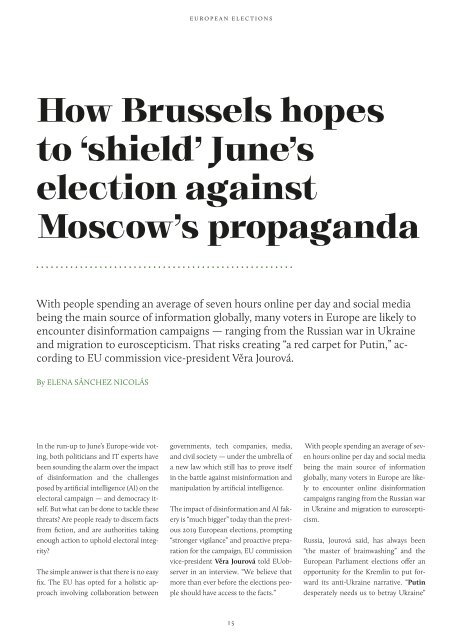EU Elections
EUobserver's guide to the 2024 European Parliament Elections.
EUobserver's guide to the 2024 European Parliament Elections.
- No tags were found...
You also want an ePaper? Increase the reach of your titles
YUMPU automatically turns print PDFs into web optimized ePapers that Google loves.
<strong>EU</strong>ROPEAN ELECTIONS<br />
How Brussels hopes<br />
to ‘shield’ June’s<br />
election against<br />
Moscow’s propaganda<br />
With people spending an average of seven hours online per day and social media<br />
being the main source of information globally, many voters in Europe are likely to<br />
encounter disinformation campaigns — ranging from the Russian war in Ukraine<br />
and migration to euroscepticism. That risks creating “a red carpet for Putin,” according<br />
to <strong>EU</strong> commission vice-president Věra Jourová.<br />
By ELENA SÁNCHEZ NICOLÁS<br />
In the run-up to June’s Europe-wide voting,<br />
both politicians and IT experts have<br />
been sounding the alarm over the impact<br />
of disinformation and the challenges<br />
posed by artificial intelligence (AI) on the<br />
electoral campaign — and democracy itself.<br />
But what can be done to tackle these<br />
threats? Are people ready to discern facts<br />
from fiction, and are authorities taking<br />
enough action to uphold electoral integrity?<br />
The simple answer is that there is no easy<br />
fix. The <strong>EU</strong> has opted for a holistic approach<br />
involving collaboration between<br />
governments, tech companies, media,<br />
and civil society — under the umbrella of<br />
a new law which still has to prove itself<br />
in the battle against misinformation and<br />
manipulation by artificial intelligence.<br />
The impact of disinformation and AI fakery<br />
is “much bigger” today than the previous<br />
2019 European elections, prompting<br />
“stronger vigilance” and proactive preparation<br />
for the campaign, <strong>EU</strong> commission<br />
vice-president Věra Jourová told <strong>EU</strong>observer<br />
in an interview. “We believe that<br />
more than ever before the elections people<br />
should have access to the facts.”<br />
With people spending an average of seven<br />
hours online per day and social media<br />
being the main source of information<br />
globally, many voters in Europe are likely<br />
to encounter online disinformation<br />
campaigns ranging from the Russian war<br />
in Ukraine and migration to euroscepticism.<br />
Russia, Jourová said, has always been<br />
“the master of brainwashing” and the<br />
European Parliament elections offer an<br />
opportunity for the Kremlin to put forward<br />
its anti-Ukraine narrative. “Putin<br />
desperately needs us to betray Ukraine”<br />
15

















